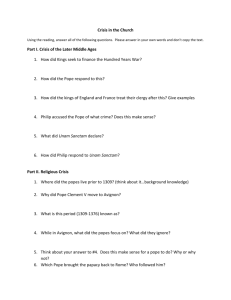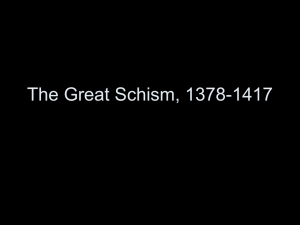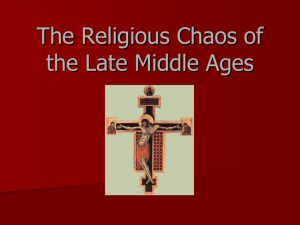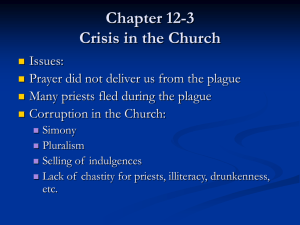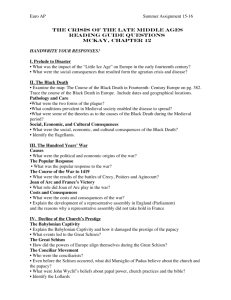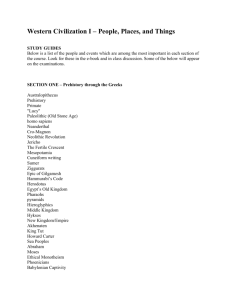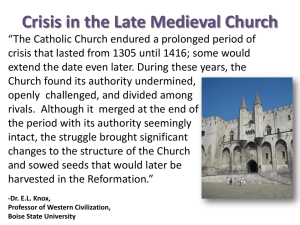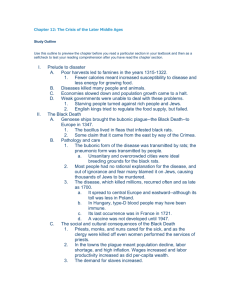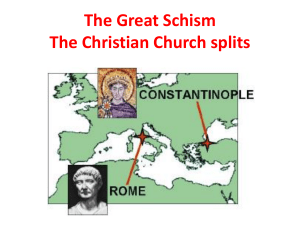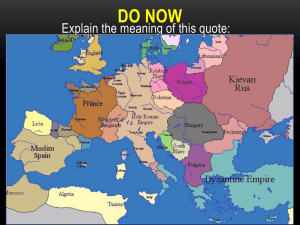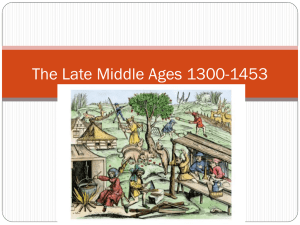The Babylonian Captivity, the Great Schism, and the Hundred Years
advertisement
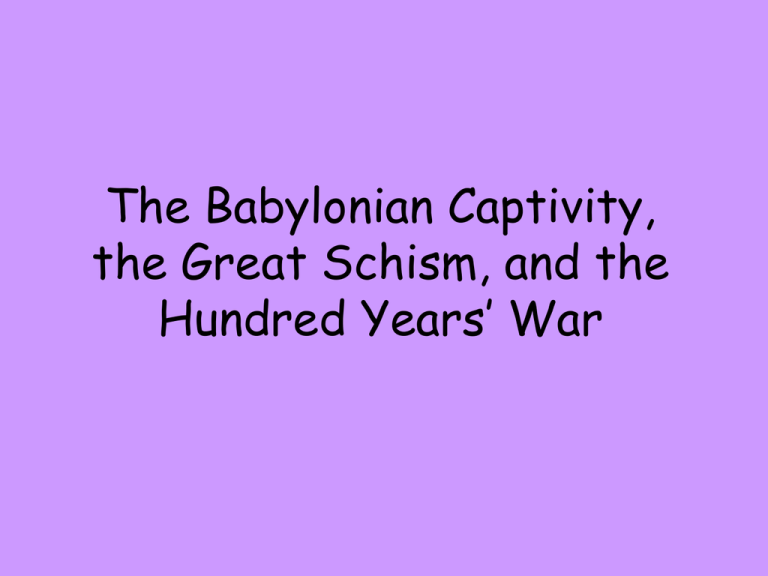
The Babylonian Captivity, the Great Schism, and the Hundred Years’ War The “Babylonian Captivity” 1309-1376 * The Catholic Church and the monarchies of Europe were at odds since the 13th century - They would fight over land, policies, and control • Philip the Fair of France pressured Pope Clement V to relocate the papal residence to an area called Avignon (SE France) so that he could control the church and its policies. - About 70 years • Called the “Babylonian Captivity” to make reference to the ancient Hebrews and their captivity in Mesopotamian Babylon Problems…. • Many Christians were opposed to the papacy’s distance from its roots in Rome • Many felt the Church was too focused on policies and not enough on spiritual matters • Rome became poor over the absence of the pope and the tourist trade • Pope Gregory XI returned the papacy to Rome in 1377, but died shortly after • The Roman citizens demanded that an Italian pope become Gregory’s successor • This led to….. ….The Great Schism 1378-1417 • The College of Cardinals felt great pressure to elect an Italian to be the next pope • They elect Pope Urban VI in 1378 • Pope Urban planned to reform the Church of its abuses • Brought the papal seat back to Rome • While Urban had good intentions, he went about it the wrong way by threatening many people! More Problems… • Pope Urban’s actions brought about disaster as many French cardinals disputed his legitimacy as pope • They elected Pope Clement VII, a relative of King Charles V of France who would live in Avignon • There are now 2 popes, hence the “Great Schism”- or division • Many countries threw their support for one pope or the other based on political motivations • The schism weakened the faith of many Christians and they questioned the Church The Conciliar Movement • The schism of the Catholic Church led many Christians to question its authority. • Many called for reform in the Church. • The Conciliarists believed that the pope should gain his political power from the people, not from a king (democratic thought) • Scholars like John Wyclif & Jan Hus believed that the Church should only be concerned with the Scriptures and Christian teachings An End to the Schism • In 1409, the Council of Pisa, consisting of cardinals from both Rome and Avignon deposed the 2 reigning popes and elected a new one • The 2 previous popes would not step down, there were now 3 popes! • The Council of Constance was then called (1414-1418) and all 3 popes were deposed. Martin V, a Roman, became pope. • The “Great Schism” was over. Future popes would never again have the power of those before them. Question? • Write a paragraph responding to the prompt below: Explain the connections between the Babylonian Captivity and the Great Schism. The Hundred Years’ War 1337-1453 • #1 Cause: Succession to the throne of France. Edward III vs. Philip VI • Edward III of England’s uncle in France died childless • Edward had the right to the French throne, but the French nobles gave the throne to a distant relative, Philip VI • Edward III and Philip VI dispute became the basis for the Hundred Years’ War • England and France have been historic enemies England’s Victories • England gained early victories: – Led by Edward III and his son, the Black Prince – Won important battles at Crecy (1346), Poitiers (1356), Agincourt (1415) – Formed an alliance with the Burgundians France’s Victories • France will officially win the war in 1453 • Joan of Arc (1412-1431) emerges during this period – – – – She is given command of an army & lifts the morale Believed she was chosen by God for this mission Dresses like a man in battle. Scandalous! Burned at the stake by the English in 1431 for being a “witch” Results of the War • Added death and destruction (aside from what the Black Plague did) • Heavy taxes led to peasant revolts • England lost £5 million to the war • Representative democracies emerge throughout Europe during this time period. The English Parliament grows stronger. Not in France • Nationalism develops: Feelings of unity and pride in your country • The rise of intelligent thought through the upcoming Renaissance time period Edward II & Edward III
